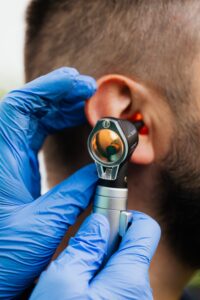What Are the Possible Causes of Inner Ear Problems?
What Are the Possible Causes of Inner Ear Problems?: Balance disorders are frequently related to issues in the inner ear, which houses the tiny organs responsible for our sense of balance.
Although there are several types of balance disorders, they frequently produce similar symptoms, and there are some common causes that account for the majority of instances.
Identifying Inner Ear Issues
If you have symptoms like dizziness, lightheadedness, balance problems, or a spinning feeling that makes you feel like you're moving even when you're standing still, you have an inner ear balance condition.
The symptoms frequently develop under particular conditions. They can happen when you move your head or eyes fast or when you are in an area with many people or objects moving around you.
Inner ear issues and their causes
If your inner ear seems to be the source of your problems, you should consult an ENT doctor. Most of the time, it is one of the following issues:
Vestibular neuritis is an illness of the inner ear caused by a virus.
Ménière's illness is a balance issue caused by high pressure in the inner ear, which can also result in tinnitus or hearing loss.
Internal ear injuries
Migraine-related symptoms of the inner ear
Once the issue has been determined, your ENT doctor can recommend the best treatment plan to manage your symptoms. Some causes of inner ear issues are straightforward to fix. For minor viral infections, the condition may even resolve itself.
Other issues, however, may necessitate more intense treatment, and you may require additional assistance to regain your sense of balance through vestibular rehabilitation activities.
The top four most frequent ear problems
Regardless, most of us take our hearing for granted daily.
Unfortunately, various issues can substantially impair the function of our ears. Each of us must be aware of some of the common indicators and effects to avoid, prevent, or delay the development of such problems. Learn more about some of the most common ear disorders by reading on.
Hearing impairment
If you suffer from hearing loss, consulting your doctor as soon as possible can make a significant difference in your recovery.
Hearing loss is not all the same, and different forms necessitate different therapies. Hearing loss is classified into three kinds.
Conductive:
When earwax or fluid accumulates in the ear, it reduces the ear's ability to conduct sound waves.
Sensorineural:
Loud noises or ageing injure the nerves in the inner ear, resulting in sensorineural hearing loss.
Mixed hearing loss occurs when difficulties in both the middle and inner ear simultaneously exist.
Hearing loss causes
A variety of variables and causes cause hearing loss. The following are the most typical causes:
advanced years
loud noise exposure
Medication
brain damage or a tumour
Stroke
Conditions that are inherited
For many people, hearing loss can be remedied with rehabilitation treatment or medical equipment; for others, surgery is required. Plan a hearing exam if you think you could be experiencing hearing loss and a complete physical check with your ear, nose, and throat doctor.
2. infections of the ears
While infants are disproportionately affected, adults are not immune to developing ear infections. Effusion describes the accumulation of fluid in the middle ear, while otitis media with effusion describes the accumulation of mucus in the third ear, both of which can cause infection.
Ear discomfort
A sensation of fullness in the ear
The ear is oozing fluid.
Fever
Hearing impairment
To diagnose an ear infection, your ENT doctor will look into your ear canal using a tiny camera called an otoscope. If your doctor believes you have an ear infection, they will let it cure on its own or give antibiotics and pain relievers, depending on the severity of the situation.
3. Tinnitus
Tinnitus symptoms include ringing, hissing, clicking, hissing, or buzzing in the ear. Tinnitus is unique to each individual and can range from loud and high-pitched to quiet and low-pitched.
Tinnitus patients frequently have hearing, work, and sleep difficulties. The following issues and circumstances frequently bring on tinnitus:
Hearing loss as we age
Loud noise exposure
Infections of the nose and ears
Heart or blood vessel complications
Meniere's syndrome
The presence of a brain tumour
Thyroid gland dysfunction
Women's hormonal changes
. Still, the overall severity of your problem will determine the therapy your ENT specialist recommends. Options include prescription drugs, hearing aids, soundproofing equipment, or operating and managing noise recommendations.
Meniere's disease is number four.
Patients with Meniere's disease frequently have brief bouts of vertigo, tinnitus, or dull hearing.
In difficult situations, the dizziness is so intense that the sufferer loses balance and falls to the ground, resulting in “falling attacks.”
Unfortunately, the actual aetiology of Meniere's disease is unknown. However, many scientists believe the sickness is caused by elevated fluid levels or fluid mixing in the inner ear canals.
Because the disease's specific cause is unknown, ENT specialists usually diagnose it based on symptoms and a physical exam.
Treatment for Meniere's disease cannot cure the disease, but it can alleviate the symptoms.
Your ENT doctor may advise you to take dizzy drugs, decrease salt intake, or take water tablets.
You may be qualified for an external ear gadget that transmits air pulses to your middle ear. If none of these therapies works, surgery may be required.
Brought To You By Ear Wax Removal Peterborough
The post What Are the Possible Causes of Inner Ear Problems? appeared first on https://gqcentral.co.uk






Comments are closed